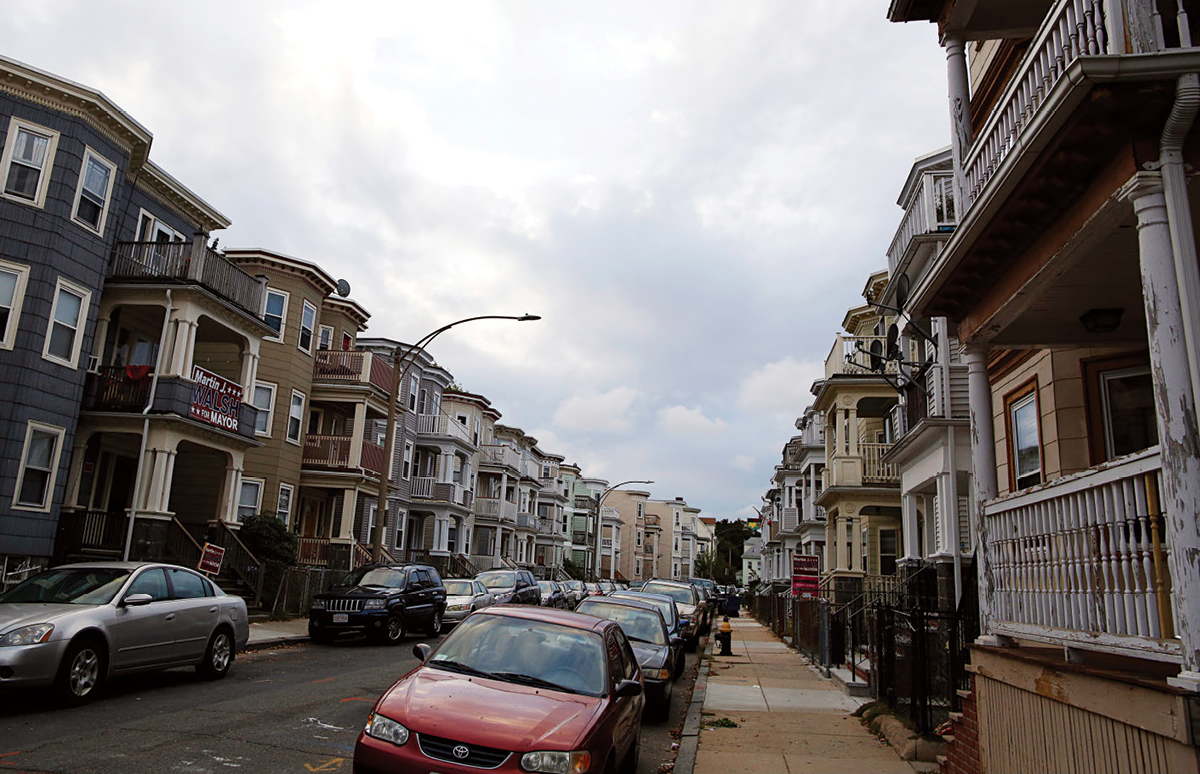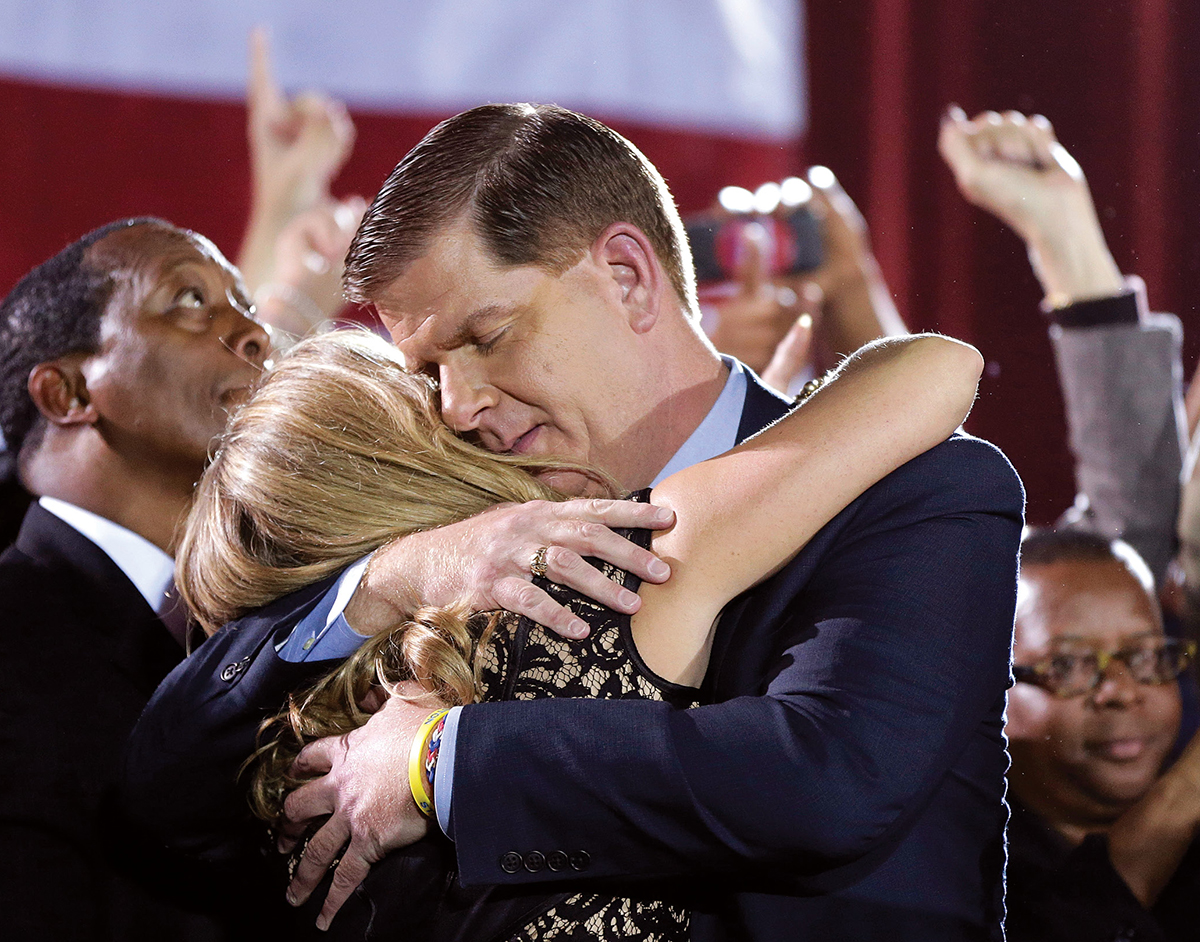Marty Walsh Is Not Tom Menino

Walsh moved out of his childhood neighborhood just last year. / Photograph by the Boston Globe/Getty Images
Walsh’s bootstraps résumé also helps explain his heterodox political philosophy—a philosophy that ultimately extended his appeal beyond the streets and union halls of Dorchester. Yes, the redhead, Irish Catholic labor leader certainly carried water for the unions in the legislature, famously sponsoring, and responsoring, a piece of dead-end legislation cowritten with the firefighters union that would have removed cities’ power to reject juicy arbitration settlements during union negotiations.
But he also played against type. As the head of the Building and Construction Trades Council of the Metropolitan District, the citywide umbrella group he ran from 2011 to 2013, he created a pre-apprentice program designed to recruit more minorities into the labor movement. In the state legislature, he was a yes on gay marriage, a no on the death penalty, a yes on driver’s licenses for undocumented immigrants. “He wasn’t going to completely walk in lock-step with the people in his district,” says House Speaker Robert DeLeo, who more than occasionally butted heads with Walsh in the legislature. “With Marty you always had the feeling that he was there primarily with the underdog.”
That’s probably the closest you’re going to get to a Grand Unified Theory of Marty Walsh. Nearly every position he takes can be reverse-engineered to reveal a soft spot for the have-nots. That can, of course, create blind spots: He insists—contrary to scientific consensus—that marijuana is a “gateway drug” and opposes legalization. It’s a perspective that seems completely informed by anecdotal evidence. But when you remember what that anecdotal evidence is, you’re more likely to forgive the occasional bout of progressive apostasy.
Now two years into his administration, Walsh’s staffers and allies continue to gush about the mayor’s big-heartedness. “If you put me on a lie detector and say, ‘What should Marty Walsh have done for a living?’ He should have been a priest,” says the mayor’s outside media adviser, Michael Goldman. The kind of priest who organized your CYO basketball league, the kind of priest who you went to, he says, when “your father was whacking your mother.” A social worker, almost.
“He’s got an absurd amount of kindness for a guy who’s the mayor of Boston,” says Dan Koh, Walsh’s chief of staff. “One time we were on a porch. Somebody knocked over a bowl of limes. Nobody else saw it except him and me. He gets up out of nowhere, gets down on hands and knees, and starts picking it up. There’s no ego.”
Not to ruin the moment, but might there be a flip side to all the compassion? Walsh has staked his reputation on his ability to help the little guy. But when you go from representing 43,000 constituents to 656,000 constituents, suddenly a lot more little guys start sending text messages to the old cell phone you refuse to give up, and suddenly, compassion can look a lot like favoritism. “If he makes a mistake, it’s not from anything conniving or with corruption,” says Danny Ryan. “Marty trusts people probably too much. He trusts people because he trusts them to be like him.”
At 11:30 a.m. on a Tuesday in January, hours before delivering his second State of the City address at Symphony Hall, Marty Walsh sits hunched over a coffee table in his City Hall office inhaling a chicken Parm sub off a paper plate. A couple of weeks earlier, the Boston Globe had published a damning report claiming that a previously unremarkable lawyer named Sean O’Donovan had become a go-to fixer for clients with projects before City Hall, thanks to personal connections in the administration. When City Hall began buying products from seemingly random companies O’Donovan represented—Bio-Organic Catalyst, anyone?—the Walsh bureaucrats who helped arrange key meetings appeared to be playing favorites. I ask Walsh where he draws the line between big-heartedness and political patronage.
“I mean, in my time as an elected official, that’s all changed,” he says between bites. “Today, in some areas it’s perceived as a crime. God forbid you help somebody get on their feet or get a job.” A few minutes later, he doubles down. “The history of politics has been patronage. Helping people get jobs has always been part of the business.” This echoed Walsh’s previously dismissive remarks on the subject. In July 2014, a former state Probation Department commissioner, John O’Brien, was convicted of running an elaborate patronage scheme. Walsh, channeling former Boston Mayor James Michael Curley—who went to jail for fraud before adopting the campaign slogan “He did it for a friend”—defended O’Brien on WGBH, calling it a “sad day for Massachusetts.”

Walsh enjoyed his mayoral victory with longtime girlfriend Lorrie Higgins. / Photograph Steven Senne/AP Images
During the mayoral election, opponent John Connolly’s main line of attack was that Walsh’s fealty to his friends in the labor movement would grind development to a halt and bankrupt the city. Walsh’s campaign, after all, owed its considerable cash advantage to the labor movement. Working America, the community affiliate of the AFL-CIO, spent more than $650,000, in part on aggressive mailers that made Connolly, a city councilor from West Roxbury, look like Montgomery Burns. One Boston, incorporated for the sole purpose of influencing the race and indirectly funded by the American Federation of Teachers, poured in nearly another half-million in the days before the election. Fears that Walsh might dole out favors to union allies naturally led to concerns that—like many Boston elected officials before him—he would be overly loyal to the rest of his political “brothers and sisters” around the city.
Right off the bat, it seemed those fears might have been justified. Early in 2014, Walsh appointed state legislator Eugene O’Flaherty as the city’s corporation counsel, or top lawyer. O’Flaherty had been tight with Walsh since they entered the legislature together in the ’90s; Lorrie Higgins, Walsh’s girlfriend, served as “Gene O’s” legislative aide for 14 years. A brash Chelsea pol, O’Flaherty wasn’t the most obvious pick for the city’s top legal job. His law degree came from a tiny Andover institution called the Massachusetts School of Law, which lacks accreditation from the American Bar Association and doesn’t require applicants to pass the LSAT. (Sean O’Donovan, a high school classmate of O’Flaherty’s, also attended.) His leading credential as counsel—aside from being Walsh’s longtime ally—came from his time serving as the House chair of the Massachusetts Joint Committee on the Judiciary. That’s nothing to sniff at, but, for comparison’s sake, Menino’s last corporation counsel served as an assistant U.S. Attorney and a peacekeeper in Bosnia and Iraq.
O’Flaherty, known in political circles for his short fuse, led one of Walsh’s weirdest, most aggressive failures to date: the 2015 lawsuit designed to stifle Steve Wynn’s plans to build a casino in Everett. The suit, filed against the Massachusetts Gaming Commission, argued that Boston deserved designation as a “host community,” which would have allowed neighboring Charlestown to vote on the casino and put the city in a better position to negotiate a more lucrative deal. The suit reflected Walsh’s protracted, bitter fight with Wynn; it dragged on for a year until a judge tossed it out last December, calling it “inflammatory” and “difficult to decipher.” By January, after spending $2 million on the case, the city reached an agreement to drop the fight for an extra $6 million in mitigation funds.
Walsh’s administration did not make O’Flaherty available for comment, but Michael Goldman disputes any suggestion that he was ill equipped for the job. “People can say what they want to say,” he contests. “We had a fabulous law firm, a guy who had won a number of cases nationally. We put together what we thought was a great argument.” As it happens, Goldman himself has become the latest Walsh insider to come under scrutiny. In February, the Globe ran a lengthy piece detailing the way Goldman and his business partner, Matt O’Neil, leveraged their City Hall connections for their own consulting business.
The story, as Walsh himself noted, felt a little thin. But Globe metro columnist Adrian Walker was onto something when he wrote, in response to the report, that “Real friends don’t enrich themselves at the expense of the politicians they support” and that “successful mayors come to understand that friendships require boundaries.”


